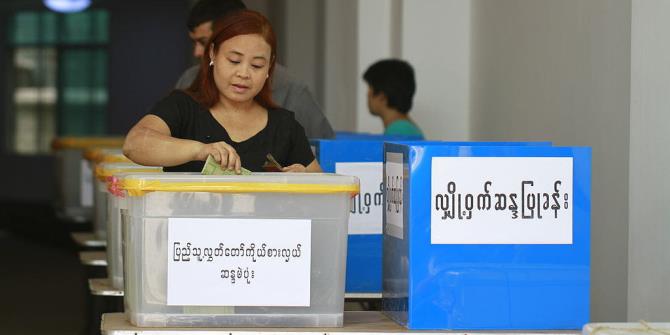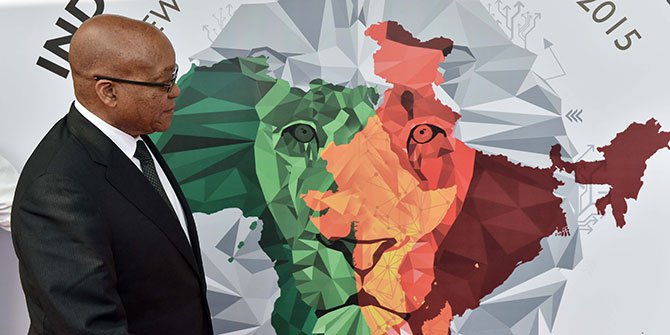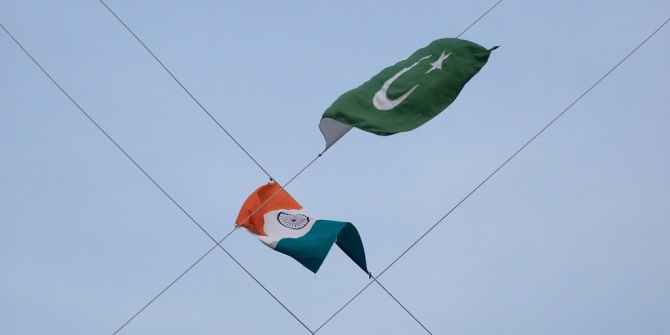 Climate change is the most significant challenge of the century, as increasing evidence of its impacts and the human actions responsible for it become apparent. There is a growing concern across the world regarding attaining the consensus and commitment needed to take action for positioning climate change in a broader foreign policy context. Mohammad Tarikul Islam examines this from the Bangladesh perspective.
Climate change is the most significant challenge of the century, as increasing evidence of its impacts and the human actions responsible for it become apparent. There is a growing concern across the world regarding attaining the consensus and commitment needed to take action for positioning climate change in a broader foreign policy context. Mohammad Tarikul Islam examines this from the Bangladesh perspective.
Although not a significant contributor to climate change, Bangladesh is one of the countries is most at risk from its projected impacts. Climatic events like cyclones, tornadoes and floods have in recent years become less predictable, and more severe and frequent. In an attempt to address the fundamental concerns, negotiation across ground level has emerged as an impending and worthwhile force for Bangladesh.
The milieu of climate vulnerability
Bangladesh is one of the most vulnerable countries to climate change due to global warming. According to current scientific understanding, the state of well-being and survival of the people in Bangladesh will be under serious threat from climate change over the coming decades. Being associated with various natural and climate change induced hazards, Bangladesh has been the worst victim in the world. Since independence in 1971, the country has endured almost 200 disaster events like cyclones, storm surges, floods, tornadoes, earthquakes, droughts and other calamities causing more than 500,000 deaths and leaving prolonged damage to quality of life, livelihoods and the economy.
Attaching climate change with negotiations
In today’s increasingly inter-connected world, the traditional instruments of diplomacy are not always effective in tackling global threats. in order to address the climate change challenge, it requires new thinking in foreign policy—thinking that considers engagement on climate change not only in the sphere of environment, but also outside the milieu container. Addressing the climate change challenge requires new thinking in foreign policy—thinking that considers engagement on climate change not only in the sphere of environment, but also outside the environment box. The country pursues a moderate foreign policy that places heavy reliance on multilateral diplomacy, especially at the United Nations. Climate negotiations results in promotion of mitigation and adaptation of climate change impact.
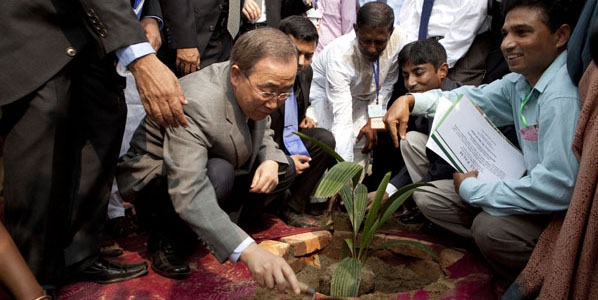
UN Secretary Ban Ki-moon visits Dhaka for a conference on climate change Photo credit: UN office, courtesy of author.
Position of Bangladesh in climate negotiations
The Ministry of Foreign Affairs (MoFA) to the government of Bangladesh has a major role to play in global climate negotiations. MoFA is mandated to carry out such responsibility at the international level in the form of bilateral or multilateral modus. Bangladesh is found to display an effective role in this area. The ministerial level meeting of the Climate Vulnerable Forum (CVF) held in 2011 in Bangladesh jointly organised by the Ministry of Environment and Forest (MoEF) and the MoEF speaks about an excellent example of success of Bangladesh in climate negotiations. The presence of the UN Secretary General at the CVF conference added value to arrive at a decision for raising common voice for the interest of vulnerable nations at different summit. In order for expediting climate change negotiations, Bangladesh intensified its effort to tackle climate change through development of the Bangladesh Climate Change Strategy and Action Plan (BCCSAP).
Bangladesh’s endeavours towards making best use of diplomatic affiliation in an attempt to address the issue of climate change is noticeable. Bangladesh government deliberately presents itself “as a worst victim, peace loving, and responsible actor and as a poor developing country.” both discourses are designed to accomplish the broader diplomatic agendas. Bangladesh found to be in positive effort to play a leading role in the last Conference of the Parties (COP). As CVF chairperson, Bangladesh played vital role in negotiation with developed countries as to reduce the carbon emission in order to keep their pledges which speaks of Bangladesh’s prospective attachment in the climate negotiations.
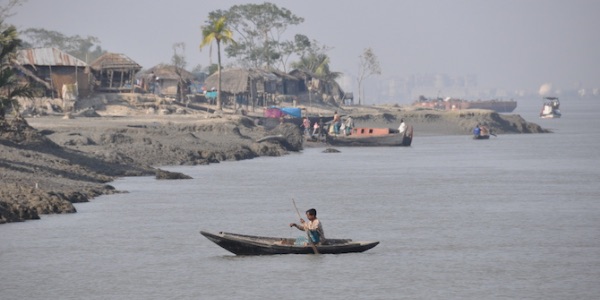
CBA Site visit to Mongla, Khulna, Bangladesh. Photo credit: Flickr, CC BY-SA 2.0.
The 21st Conference of Parties or CoP21 of the United Nations Framework Convention on Climate Change (UNFCCC) ended with all the 195 member countries of the planet agreeing to the “Paris Agreement” from November 29 to December 11, 2015 at Le Bourget in Paris. Similar to CoP21, Bangladesh had a team led by the Minister of Environment and Forests in CoP23 where a large presence of scientists, think tanks, civil society organisations, NGOs, private sector and media from Bangladesh. The Bangladesh delegates worked well together focusing on issues of their concerns and interacted well within G77, LDC, and the Climate Vulnerable Forum (CVF) groups. Bangladesh leadership in adaptation, particularly community based adaptation is well known to many participating delegates, practitioners and scientists.
To achieve the vision of becoming a middle income country by 2021 and rich country by 2041, it is crucial that Bangladesh is capable of integrating all aspects of climate change into its planning and delivery of services to the citizens and ecosystems. Even, there has long been a discussion in some government, civil society and planning sectors to set up a new Ministry of Climate Change in Bangladesh. In an emerging SDG world, this would be a progressive and major step for Bangladesh to achieve its sustainable development goals. For this to be efficient there is an absolute need to strengthen the Ministry of Environment and Forests with appropriate expertise to address the challenges of climate change.
How can Bangladesh improve its position?
To take leadership role in post-CoP, there is a need for an exercise regarding what individual agencies of the government, research community, civil society and private sector can do. But we can always start with a few key activities. For discharging role of negotiating on country’s behalf on climate change, Bangladesh should think about appointment of the high level climate change envoys. climate change will remain central for Bangladesh for many years to come and investing in such a high level special envoy who has the trust of the government and the requisite diplomatic (rather than technical) background and skills, along with a team from the relevant ministries, is essential even now. With regard to gaining financial support from any new international adaptation funds, Bangladesh needs to make the case for getting its due share based on its performance and ability to do the right things with transparency and good governance, rather than staking an a priori claim for a certain share.
Bangladesh has a strong bond because it produces the least emission of greenhouse gases yet Bangladesh is the most vulnerable to climate change. Significant amount of emissions are released by the developed and the fast growing developing countries Brazil, South Africa, India and China, which are known as basic countries. Bangladesh needs to persuade the rich and the basic countries realize that they have the right to develop, but they do not have any right to pollute. Bangladesh must persuade them that there is technology for development keeping the level of emission low. Bangladesh foreign policy stands primarily on two pillars: security and development.
The Ministry of Foreign Affairs (MoFA) could provide regular briefings on climate negotiations to its missions abroad and in the longer term should send some junior officers for higher studies in climate negotiations. However, given the importance of this topic for Bangladesh’s future, Bangladesh should consider appointing a personal “special climate change envoy/adviser” to ensure effective representation of Bangladesh at important high level international meetings. A Number of both developed and developing countries has appointed such “special climate change envoys/advisers”. Nevertheless, Bangladesh should maintain its favourable image as a cooperative partner of the international community. The fear of losing face may constrain its behaviours.
About the Author
 Mohammad Tarikul Islam is the Assistant Professor to the Department of Government and Politics, Jahangirnagar University, Bangladesh. He previously worked at the United Nations for seven years on projects relating to local governance, democracy, disaster management, the environment and climate change. Professor Islam’s research and teaching interests are in local government, human security, conflict resolution and disaster nexus development. He can be reached at t.islam@juniv.edu
Mohammad Tarikul Islam is the Assistant Professor to the Department of Government and Politics, Jahangirnagar University, Bangladesh. He previously worked at the United Nations for seven years on projects relating to local governance, democracy, disaster management, the environment and climate change. Professor Islam’s research and teaching interests are in local government, human security, conflict resolution and disaster nexus development. He can be reached at t.islam@juniv.edu




